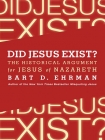Did Jesus Exist? - The Historical Argument for Jesus of Nazareth Bart Ehrman (books to read in your 20s txt) 📖

- Author: Bart Ehrman
Book online «Did Jesus Exist? - The Historical Argument for Jesus of Nazareth Bart Ehrman (books to read in your 20s txt) 📖». Author Bart Ehrman
Who would make up the idea of a crucified messiah? No Jew that we know of. And who were Jesus’s followers in the years immediately after his death? Jews living in Palestine. It is no wonder that Paul found their views so offensive. They were claiming that Jesus was God’s anointed one, the one who stood under God’s special favor, the great and powerful ruler over all Israel. Jesus—the man who was executed for sedition against the state? He’s the one blessed of God, his powerful solution to the plight of the chosen people? A crucified criminal? That’s worse than being crazy. It’s an offense against God, blasphemous. Or so thought Paul. And so he persecuted this tiny sect of Jews and tried to destroy them.
It is hard today to understand just how offensive the idea of a crucified messiah would have been to most first-century Jews. I try to illustrate it to my class by giving an analogy. What would you think if I tried to convince you that David Koresh was God’s chosen one through whom he is going to rule the earth? David Koresh? The leader of the Branch Davidians at Waco, who stockpiled guns and abused children, who was killed by the FBI? He’s God’s chosen one? Yes, he is the Lord of all. What are you, completely nuts? (I get in trouble with my students every time I use this illustration. At the end of term I invariably get a comment or two from students who can’t believe that Ehrman thinks David Koresh is the Lord….)
If it is hard to imagine Jews inventing the idea of a crucified messiah, where did the idea come from? It came from historical realities. There really was a man Jesus. Some of the things he said and possibly did make some of his followers wonder if he could be the messiah. Eventually they became convinced: he must be the messiah. But then he ran afoul of the authorities, who had him arrested, put on trial, and condemned to execution. He was crucified. This, of course, radically disconfirmed everything his followers had thought and hoped since he obviously was the furthest thing from the messiah. But then something else happened. Some of them began to say that God had intervened and brought him back from the dead. The story caught on, and some (or all—we don’t know) of his closest followers came to think that in fact he had been raised. This reconfirmed in a big way the hopes that had been so severely dashed by his crucifixion. For his reinspirited followers, Jesus truly is the one favored by God. So he is the messiah. But he is a different kind of messiah than anyone expected. God had a different plan from the beginning. He planned to save Israel not by a powerful royal messiah but by a crucified messiah.
Since no one would have made up the idea of a crucified messiah, Jesus must really have existed, must really have raised messianic expectations, and must really have been crucified. No Jew would have invented him. And it is important to remember that Jews were saying that Jesus was the crucified messiah in the early 30s. We can date their claims to at least 32 CE, when Paul began persecuting these Jews. In fact, their claims must have originated even earlier. Paul knew Jesus’s right-hand man, Peter, and Jesus’s brother James. They are evidence that this belief in the crucified messiah goes all the way back to a short time after Jesus’s death.
A Suffering Messiah?
But weren’t there any Jews who expected the messiah to suffer and die? The short answer is that so far as we can tell, there were not. My students often find this hard, even impossible, to believe. They have been raised in Christian churches, where it is taught that the messiah was supposed to suffer, and they are guided to such passages as Isaiah 53, in the Old Testament, as proof:
He was despised and rejected by others,
a man of suffering and acquainted with infirmity…
Surely he has borne our infirmities
and carried our diseases;
yet we accounted him stricken,
struck down by God, and afflicted.
But he was wounded for our transgressions,
crushed for our iniquities;
Upon him was the punishment that made us whole,
and by his bruises we are healed (Isaiah 53:3–5)
Students sometimes quote these verses to me and then say with a smug smile, “See! The messiah was predicted to suffer!” My response is always the same: I ask them to show me where in the passage the word messiah occurs. The students are typically nonplussed when the see that the word messiah does not appear anywhere in this passage. They protest: “But this sounds just like the crucifixion of Jesus! And so does Psalm 22. And Psalm 69.” And so on. I ask them in each case to see if the author is talking about the messiah. Each of these passages talks about someone suffering, but that someone is never the messiah.
In Isaiah 53, for example, the sufferer is called not the “messiah” but the “servant of the Lord,” and the passage speaks about his sufferings in the past tense, as something that has already happened at the time of writing (six hundred years before Jesus). As interpreters have long noted, if read in context, the author actually tells us who this servant of the Lord is. In Isaiah 49:3 the prophet declares, “And he said to me, ‘You are my servant, Israel, in whom I will be glorified.’”
It is Israel who is God’s servant, who has suffered for the sins of the people and so brought healing. Isaiah 53 was written during the Babylonian exile when the Babylonian armies had taken





Comments (0)